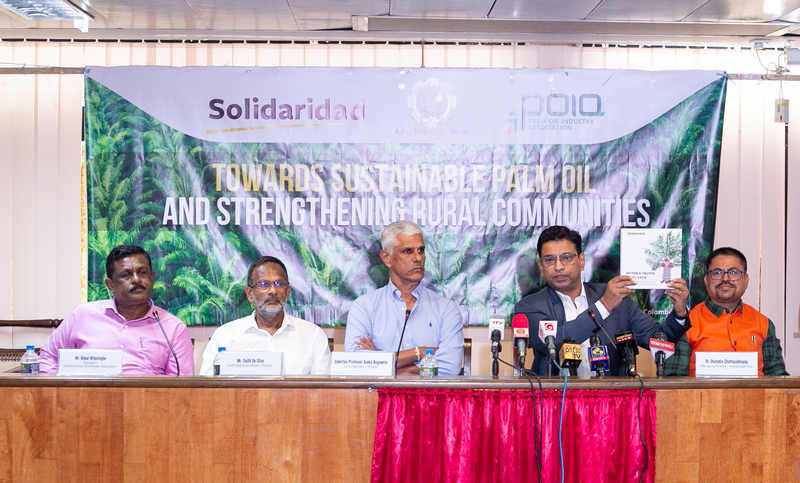
Palm Oil – Transforming Sri Lanka’s Lost Opportunity into a Lucrative, Sustainable Industry
The Asian Palm Oil Alliance, a multilateral body representing the industry in Asia, Solidaridad, a global network that supports smallholder farmers and workers, and the Palm Oil Industry Association of Sri Lanka, came together at a joint press conference, held at the OPA Auditorium in Colombo 07, on the 30th of May 2023. The event shed light on the untapped potential presented by oil palm cultivation in Sri Lanka. With a focus on sustainable practices and the strengthening of rural communities, key representatives of the two organizations highlighted the immediate short, medium and long-term, economic and social gains that could be achieved through this promising, lucrative and sustainable industry.
The present legal and regulatory impediments to cultivating oil palms stand as a lost opportunity for Sri Lanka. Just like alternative crops grown to obtain vegetable oil, oil palms provide a year-round source of income for plantation workers and small plantation owners. It also holds immense potential to bolster the country’s economy on various fronts, by reducing reliance on imported edible oils, and potentially creating a lucrative export industry in the future. In fact, Solidaridad has released the “Myths and Truths of Oil Palm,” a research-based scientific study that provides information and assessments on palm oil through an in-depth literature review on research findings by over 15 leading scientists from top universities and research institutions across Indonesia, Malaysia, India and Sri Lanka.
With over LKR 11 billion in direct and indirect contributions to Sri Lanka’s GDP, the oil palm plantation and milling sectors play a pivotal role in the nation’s economic landscape. Approximately 60% of this economic impact stems from the plantations, while the remaining 40% arises from the milling sector. Moreover, these sectors create over 5,000 employment opportunities, supporting the livelihoods of around 21,000 individuals. As a result of the high-value crop and outsized demand for palm oil, the industry also has the potential to generate high-income employment, with an average monthly income of LKR 185,000 per employee. This is significantly higher, in many instances by a factor of two, when compared with workers involved in tea, rubber, coconut and other plantations.
Discussing the matter in detail at the press conference, Emeritus Professor Asoka Nugawela Ex Co Member – POIASL said, “It is crucial to thoroughly evaluate the economic benefits associated with oil palm cultivation, along with its present and potential future contributions to GDP, rural development and alleviation of poverty. Instead of misguided policies, without proper assessment, we should consider the positive impact palm oil can have on our nation’s sustainable development.”
To capitalize on the opportunities that oil palm cultivation presents, POIASL proposed a range of key steps for Sri Lanka to take. Most importantly, the immediate need for comprehensive stakeholder collaboration and cooperation, including government, industry and local communities, towards the establishment of a comprehensive framework for sustainable cultivation of oil palms in Sri Lanka.
Dr. Suresh Motwani Secretary General of APOA said “Our regional peers exemplify the positive outcomes of sustainable palm oil production. Malaysia and Indonesia, for instance, have successfully harnessed the potential of this crop, not only in terms of economic growth but also to establish sustainable, environmentally-responsible supply and value chains, empowering rural communities. Their success can be fast-tracked using these established and proven practices to ensure that oil palm cultivation in Sri Lanka is sustainable and aligned with the United Nations Sustainable Development Goals’’.

About POIASL
The Palm Oil Industry Association of Sri Lanka (POIASL) is the apex body representing the palm oil industry in Sri Lanka. With a vision to foster sustainable growth, POIASL plays a crucial role in facilitating collaboration among stakeholders, including government bodies, industry players, and local communities. The association strives to uphold best practices in palm oil cultivation, milling, and processing, while also advocating for responsible environmental stewardship. Championing sustainable practices and supporting the development of rural communities, POIASL aims to maximize the economic potential of the palm oil industry in Sri Lanka, contributing to the nation’s overall growth and prosperity.


